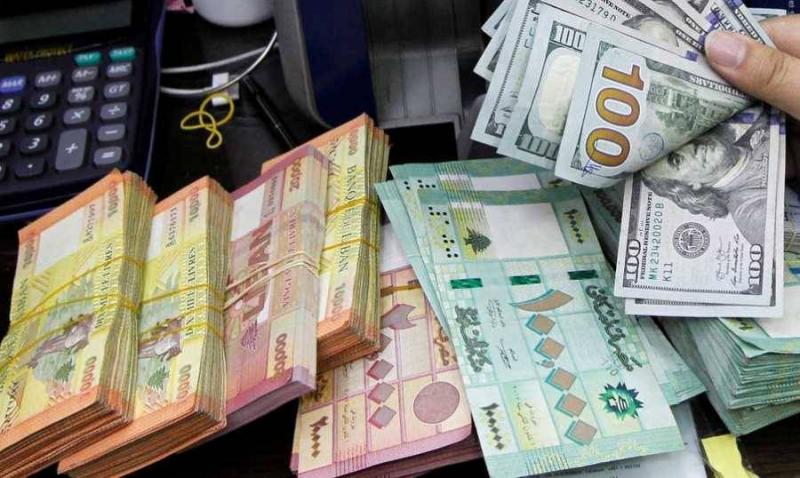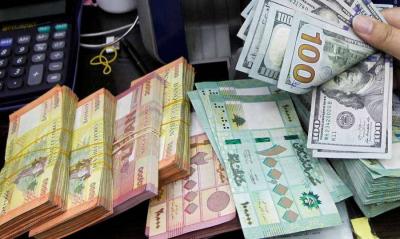The World Bank has put an end to speculation regarding the shift in Lebanon's GDP trajectory from a timid recovery to ongoing contraction for the fourth consecutive year, albeit at a minimal rate, as the country has once again fallen into the grip of the ongoing war in Gaza and its ramifications on the southern border. This situation is further compounded by the effects of political vacuum and continuous institutional paralysis.
According to the latest periodic report from the Lebanon Economic Monitor issued by the international institution, which was received by "Al-Sharq Al-Awsat," the current conflict centered in Gaza, now entering its third month, represents a significant additional shock to the unstable Lebanese economic growth model, particularly regarding its impacts on growth dynamics and the current account, as well as on the tourism sector, which alone accounted for over 26 percent of current revenue last year.
Commenting on these developments and their updates, Jean-Christophe Carre, the World Bank's regional director for the Middle East, estimates that in light of the limited progress toward a comprehensive crisis resolution plan, Lebanon remains mired in a severe social, economic, and financial crisis exacerbated by institutional and political stagnation.
Moreover, although tourism positively contributed to economic growth in the past period, according to Carre, the tourism sector alone cannot substitute for more comprehensive, sustainable, and diverse growth engines that could better equip the country to withstand shocks and help restore its economy to a robust recovery path.
In renewed affirmations of the urgent measures required, the World Bank stated in its report that if a comprehensive crisis resolution plan is not implemented, there will be no viable long-term investments, and Lebanon will suffer further erosion of its physical, human, social, and natural capital. After four years of the economic and financial crisis, Lebanon's macroeconomic framework continues to face significant weaknesses.
The title "Lebanon's Fragile Economy Returns to Stagnation" topped the Lebanon section in the World Bank's periodic report (Fall 2023), which included updates on key economic developments and assessments of their implications for the country's future prospects. The specific section of the report titled "Impact of the Conflict in the Middle East on the Lebanese Economy" addressed the effects of the current conflict and its implications for the Lebanese economy and growth prospects amidst prolonged political and institutional vacuums.
In a systematic conclusion that assumes the current containment of military confrontations on the southern border, an analytical scenario to assess the impact of decreased tourism spending on economic growth found that real GDP will contract by 0.6 to 0.9 percent, reflecting a positive baseline prior to the conflict estimated at a marginal growth of 0.2 percent this year. This figure contrasts with previous estimates from the central bank, which had predicted growth might rise between 2 and 3 percent due to exceptional activity during the summer tourism season and the success of businesses in vital sectors in adapting to the realities of financial and monetary crashes.
Forecasts from international financial institutions, as well as local banking research centers, had agreed that the Lebanese economy would achieve positive growth this year for the first time since 2018. It seemed that the Lebanese economy had reached a temporary bottom after years of severe contraction before again facing renewed pressures from the current conflict in Gaza and its observable ramifications in the region, leading to reversed expectations of a return to stagnation arising from the impacts of the ongoing conflict and the absence of wider economic stability.
Fundamentally, this marginal growth is largely based on highly volatile factors, primarily driven by consumption growth due to a strong summer tourism season, a significant inflow of remittances, increases in dollarized salaries, as well as indications of noticeable stability in private sector activity. Meanwhile, macroeconomic imbalances persist, according to the World Bank, with the current account still facing a substantial deficit amounting to 12.8 percent of GDP.
Lebanon’s central bank has initiated limited but encouraging reforms amidst a relative stability in the exchange rate. However, according to the World Bank, substantial changes to banking supervision, monetary policy management, and exchange rate policies need to be introduced. The continued absence of a fair settlement for the banking sector, which includes a pre-distribution of losses and restructuring operations, undermines recovery prospects in Lebanon.
The significant inflow of remittances, which has long represented a lifeline for Lebanon, has provided an implicit safety net and contributed to a slight increase in local consumption. However, remittances alone are insufficient, according to international institutional estimates, to meet Lebanon's external financing needs. In the absence of other funding sources, the double deficit in the current account and public finances may require further withdrawals from the central bank's foreign currency reserves.
Concurrently, inflation, which has exceeded 100 percent since 2021, is expected to accelerate to 231.3 percent by the end of this year, driven by the stable exchange rate that has hovered around 90,000 Lebanese pounds per dollar since mid-year, and the rapid dollarization of economic transactions. This is in addition to the continued implementation of the monthly dollar disbursement measure for all public sector employees, numbering over 320,000.
Furthermore, Lebanon topped the list of countries most affected by nominal inflation in food prices in the first quarter of 2023, at 350 percent year-on-year, according to World Bank statistics released in the spring of this year. This has exacerbated the fragility of living conditions for the poorest and most needy segments of the population.
Moreover, the sovereign debt, which reached 179.2 percent of GDP in 2022, remains unsustainable amid a sharp decline in currency value and economic contraction, coupled with the absence of a comprehensive debt restructuring plan.




